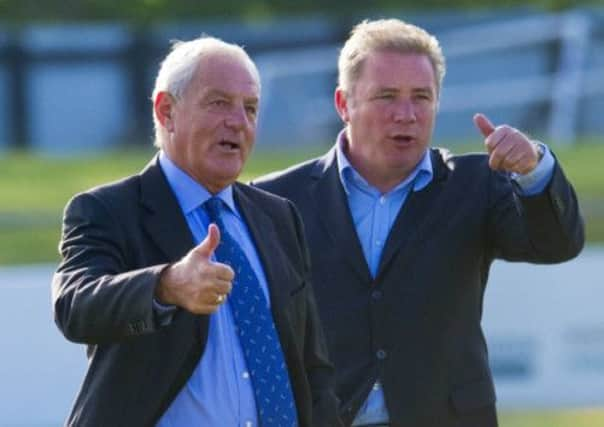Glenn Gibbons: Walter Smith’s shifting loyalties


Nobody could reasonably take exception to dedicated supporters fighting their team’s corner in the event of perceived attacks from numerous quarters, but when defiance spills over into delusion, the truly relevant and potentially most harmful fundamental problems tend to be neglected in the cause of impulsive and ill-conceived retaliation.
Hence the readiness of too many of the Ibrox club’s followers over the past few years not only to acclaim, but to go to war on behalf of a succession of extremely unreliable (and generally self-styled) “redeemers”, from David Murray through Craig Whyte to Charles Green and sundry other figures of dubious motives and character.
Advertisement
Hide AdAdvertisement
Hide AdThe most remarkable and unfathomable aspect of the support for the various liberty takers is that so many should rush to demonstrate such vociferous and frequently hostile allegiance to men whose “credentials” sprang mainly from hearsay, or, more often, from ill-informed media speculation.
Yet Murray, whose excesses initiated the economic devastation that made the club vulnerable to the predatory and plundering Whyte and Green, was allowed to enjoy without a murmur of suspicion from anyone connected to Ibrox 20 years of steady, but unrelieved, erosion of its finances.
When the former director, the late Hugh Adam, made his apocalyptic assessment of the Murray modus operandi, he was shouted down as merely a bitter ex-employee. As far as can be ascertained, none of his detractors so far has admitted that everything Adam predicted has come to pass.
At the first whisper from outside observers of Whyte’s potential for inflicting further damage on Rangers, there were marches in his defence on the BBC headquarters in Glasgow and, of course, the hundreds-strong protest outside the empty SFA offices at Hampden Park one gloriously comical Saturday morning.
Green was another hero originally the object of adulation and undying devotion on the grounds that he and his consortium had rescued the club from extinction by producing the funds to acquire its assets, while other supposed saviours simply made inconsequential noises.
Now, following his return in the decidedly nebulous role of “consultant”, Green appears to attract new levels of hissing from the faithful with each passing day. To borrow from Terry Jones in Monty Python’s Life Of Brian, they were not Messiahs, they were very naughty boys.
All of this turmoil was bound to leave a support as broadly-based as that commanded by the Ibrox club as disarrayed as the institution itself, with internet forums throbbing with charge and counter-charge among fans who, ironically, share the primary wish of seeing their team achieve a new pre-eminence.
Yet, despite the cause and effect of the present chaos, there remains a puzzling insistence among the overwhelming majority of football reporters that Walter Smith remains “the only man the fans can trust.”
Advertisement
Hide AdAdvertisement
Hide AdThis is a distinction that hardly squares with Smith’s own inconstancy since the descent towards liquidation began early last year. Having fronted a consortium said to have included the billionaire businessman, Jim McColl, in a late bid to foil the takeover by the Green group, and having followed this with an entreaty to fans not to buy season tickets on the grounds that the new owners could not be trusted, Smith was curiously happy to accept a non-executive directorship (reputedly for a substantial honorarium) when it was offered by Green.
By the time he accepted the invitation to assume the chairmanship three months ago, Smith had been strangely quiet throughout his time on the board, a silence that would continue after his elevation. Throughout the turbulence, he has demonstrated a propensity for shifting loyalties that seems unbecoming for an aspiring – and inspiring – leader.
Indeed, Smith’s rather fluid sense of loyalty and allegiance recalls a line from Robert Bolt’s play, A Man For All Seasons. Berating his son-in-law, Will Roper, over his changeable, on-off relationship with the church, Thomas More tells him: “We must just pray that when your head stops spinning, your face is to the front again.”
Despite his history of vacillation and being satisfyingly rewarded at Ibrox, when Smith quit this week (he had been Green’s enemy, then his ally, and now he’s reverted to enmity), he triggered an extraordinary series of eulogies. One newspaper article described his efforts on Rangers’ behalf in these hard times as “valiant” and “selfless”, adjectives that would sit more comfortably on aid workers in the world’s most dangerous places.
Another reminded us of Smith’s imperishable love of the club with the quite absurd claim that he had even relinquished his post as Scotland manager in 2007 to ride to Rangers’ rescue after the team’s slump while in the hands of the hapless Paul le Guen. In recording this act of heroic sacrifice, the author omitted the detail that Smith’s defection from Hampden may have been at least partly inspired by the assurance that he would more than triple his wages.
If there has been so much as implied criticism of Smith’s departure, it has concerned the likelihood that he has left his old ally, Ally, as an easy target for Green’s whimsy. This is as unwarranted as the fawning tributes that would have Smith recognised as a demi-god.
With a seemingly endless string of impulsive, ill-considered and ill-advised outbursts on a range of issues and events – in addition, of course, to too many embarrassing setbacks in competitions at home and in Europe – McCoist has proved perfectly capable of finding trouble on his own.